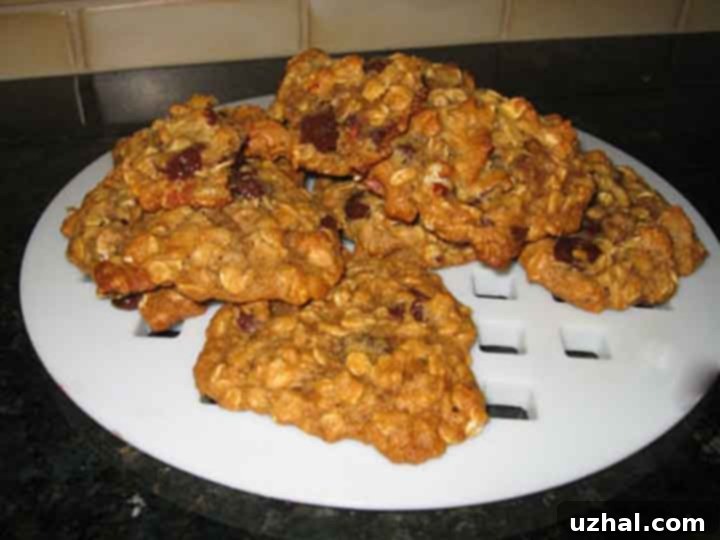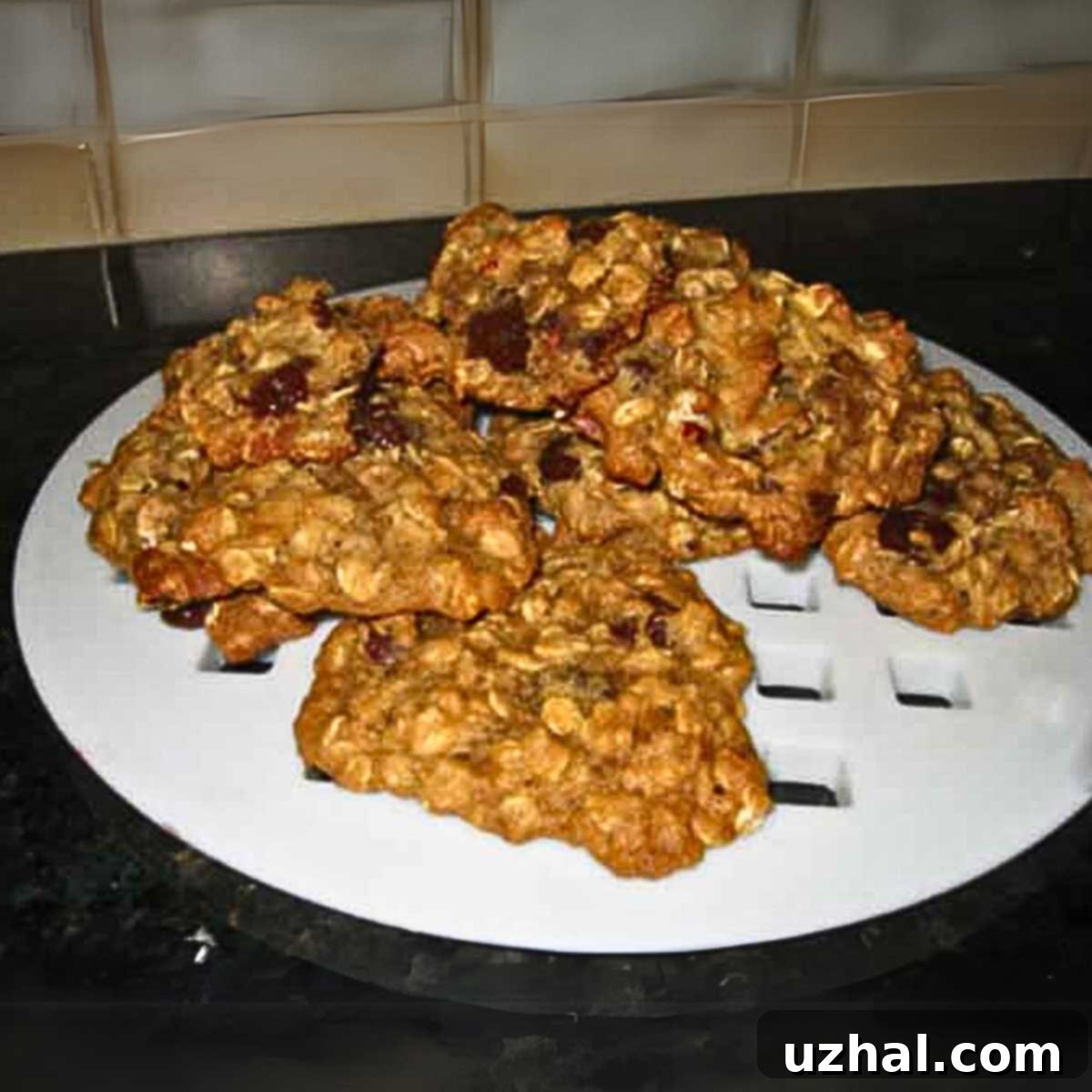Delicious & Easy Vegan Oatmeal Cookies: Your Ultimate Guide to Egg-Free Baking
Embark on a delightful baking journey with our timeless recipe for vegan oatmeal cookies. This recipe is a testament to the fact that incredibly delicious treats don’t require fancy or hard-to-find ingredients. Instead, it relies on simple pantry staples, transforming them into chewy, satisfying cookies that everyone can enjoy. Perfect for those with egg allergies, dairy sensitivities, or anyone simply looking to explore the wonderful world of plant-based baking, these cookies offer a fantastic solution without compromising on flavor or texture. We’ll show you how a humble banana can work wonders as an egg substitute, resulting in moist, flavorful vegan chocolate chip oatmeal cookies, and also introduce you to other versatile egg replacers for a truly customizable baking experience.

These vegan oatmeal cookies are not just for vegans; they are a fantastic option for anyone with an egg allergy or those seeking a healthier dessert alternative. The texture is truly remarkable – a pleasant cakiness that isn’t overwhelmingly dense, providing a comforting bite. While they lean a little towards the sweet side, this can be beautifully balanced with smart additions. I often recommend adding toasted pecans, which introduce a wonderful nutty counterpoint that mellows the sweetness and adds an extra layer of crunch. Other additions like chopped walnuts or a mix of dried fruits can also achieve a similar effect. It’s crucial, however, to resist the urge to reduce the sugar content in the recipe itself. Sugar plays a vital role beyond just taste; it contributes significantly to the cookie’s structure, browning, and overall texture. Altering the sugar amount can throw off the delicate balance of ingredients, potentially leading to cookies that are either too dry, too crumbly, or spread too much. And, of course, a generous handful of chocolate chips is always a welcome inclusion, elevating these simple cookies into a truly decadent treat.
Mastering Egg-Free Baking: Advanced Egg Substitutes
Since the original inception of this recipe, the landscape of vegan baking has evolved wonderfully, offering even more versatile options for egg substitutes. While a ripe banana serves as an excellent binder and moisture provider, imparting its distinct flavor, there’s another star in the vegan kitchen: aquafaba. This remarkable liquid, typically drained from canned chickpeas, acts as a near-flavorless egg replacer, making it ideal when you want your vegan oatmeal cookies to shine without any underlying banana notes. You can use aquafaba straight from the can, approximately three tablespoons per egg, or for a lighter, airier texture, whip it slightly before incorporating it into your dough. Whipping aquafaba, much like egg whites, can introduce more air, resulting in a lighter cookie. If your canned chickpeas are salted, remember to adjust the salt content in your recipe accordingly, perhaps dialling it back to around ⅜ teaspoon to prevent overly salty cookies.
Beyond banana and aquafaba, the world of egg substitutes for vegan baking is rich with options. Flax eggs (1 tablespoon ground flaxseed mixed with 3 tablespoons water, rested for 5 minutes) and chia eggs offer excellent binding properties and a nutritional boost, though they can sometimes add a slightly nutty texture. Applesauce is another great option for moisture and sweetness, especially in fruit-based cookies, but be mindful of its impact on the overall sugar content. Commercial egg replacers are also readily available and often designed for general baking, offering convenience and consistent results. Each substitute has its unique characteristics, allowing you to fine-tune your vegan oatmeal cookies to your preferred taste and texture. Experimentation is key to finding your favorite!
Choosing the Best Vegan Spreads for Perfect Cookies
The choice of vegan spread or butter is incredibly important in achieving the desired richness and texture in your plant-based cookies. Thankfully, the market has seen a surge in high-quality, great-tasting vegan spreads that mimic traditional butter remarkably well. Brands like Melt and Olivio consistently receive high marks for their excellent flavor and melting properties, making them ideal for baking. Earth Balance has long been a staple in vegan kitchens, known for its reliable performance in a wide range of recipes. Miyoko’s Kitchen also offers premium, cultured vegan butter that provides a luxurious, rich flavor profile, often preferred for more gourmet baking applications.
When selecting a vegan spread, consider whether you’re using a stick or tub variety, as their fat content and water composition can differ, impacting the final cookie texture. For baking, stick-form vegan butters often yield results closest to dairy butter due to their higher fat content. These quality vegan butters not only contribute essential moisture and richness but also aid in the browning process, giving your vegan oatmeal cookies that beautiful golden-brown finish. If you’re looking for alternatives, refined coconut oil can also be used, though it will impart a subtle coconut flavor and result in a slightly different texture, often a bit crisper. Always ensure your chosen spread is at room temperature for optimal creaming with sugars, which is vital for developing a light and airy cookie structure.
The Science of Oats: Quick vs. Old-Fashioned
Oats are, of course, the star of our vegan oatmeal cookies. But did you know the type of oats you choose can significantly impact your cookie’s texture? Quick oats, also known as instant oats, are pre-cooked, dried, and then rolled and cut into smaller pieces. This processing means they absorb liquid much faster and break down more readily during baking, resulting in a softer, more uniform cookie texture. If you prefer a chewier, more substantial cookie with visible oat pieces, old-fashioned (rolled) oats are your best bet. They are less processed and maintain their shape better, lending a delightful chewiness and hearty feel to your vegan oatmeal cookies. Both types work in this recipe, but knowing the difference allows you to tailor the cookies to your personal preference. For a truly hearty cookie, a mix of both can even be explored!
Sweetening Your Vegan Cookies: Beyond Sugar
As mentioned, the sugar content in this recipe is important for structure. However, this doesn’t mean you can’t play with additional flavors to enhance your vegan oatmeal cookies. Beyond toasted pecans or chocolate chips, consider incorporating warm spices like nutmeg, ginger, or a pinch of allspice to complement the cinnamon. Dried fruits such as raisins, cranberries, or chopped apricots add natural sweetness and a lovely chewiness. For an extra layer of indulgence, a swirl of vegan caramel before baking, or a sprinkle of flaky sea salt on top of the warm cookies, can elevate the flavor profile. These thoughtful additions allow you to customize each batch, turning a simple recipe into a gourmet experience without altering the fundamental balance of the base dough.
Tips for Vegan Cookie Perfection
Achieving perfect vegan oatmeal cookies every time is easy with a few simple tips. Firstly, ensure all your wet ingredients, especially the vegan butter (or oil) and banana, are at room temperature. This helps them emulsify properly, creating a smooth, consistent dough. When mixing the wet and dry ingredients, avoid overmixing. Overworking the flour can develop too much gluten, leading to tough cookies. Mix until just combined, then fold in your oats and any additional mix-ins like chocolate chips or nuts. If your dough seems too sticky, chilling it for 30 minutes to an hour can make it much easier to handle and also helps prevent spreading. If the dough is too dry, add a tiny splash of plant-based milk (almond, soy, or oat work well) until it reaches the right consistency. Conversely, if it’s too wet, a tablespoon or two of extra flour can fix it, but remember that the oats will absorb liquid as they sit, so a slightly wet dough can firm up naturally. Always use a scoop for consistent cookie size, ensuring even baking.
Storage and Serving Suggestions
Once baked and cooled, these vegan oatmeal cookies store beautifully. Keep them in an airtight container at room temperature for up to 3-4 days to maintain their freshness and chewy texture. For longer storage, you can freeze the baked cookies for up to 2-3 months. Simply thaw them at room temperature or gently warm them in a low oven for a fresh-baked experience. These cookies are wonderfully versatile. Enjoy them with a glass of cold plant-based milk, a warm cup of coffee or tea, or as a delightful snack on their own. They also make a thoughtful homemade gift for friends and family, especially those with dietary restrictions. Their hearty nature makes them a satisfying treat any time of day, from breakfast on the go to an evening indulgence.
- Maple Pecan Chocolate Chip Cookies
- Peanut Butter Chocolate Chip Cookies
- Oatmeal Chocolate Chip Cookies
- Small Batch Vegan Peanut Butter Cookies
- Vegan Oatmeal Chocolate Chip Cookies (Small Batch)
Recipe: Classic Vegan Oatmeal Cookies

Vegan Oatmeal Cookies
Anna
Pin Recipe
Ingredients
- 1 cup brown sugar (200 grams)
- ½ cup white sugar (100 grams)
- ¼ cup plus 1 teaspoon oil (48 grams)
- 3 tablespoons water or cold coffee
- 1 medium banana, mashed (100 grams – or 3 tbsp aquafaba)
- 1 ½ teaspoons vanilla extract
- 1 ½ teaspoons cinnamon
- 1 ½ cups all-purpose flour (190 grams)
- 1 teaspoon baking soda
- ½ teaspoon salt
- 2 ¼ cups oats, quick or old fashioned
- 1 cup vegan chocolate chips or toasted pecans (optional)
Instructions
-
Preheat oven to 350 degrees F (175 C). Prepare a baking sheet with parchment paper.
-
In a large mixing bowl, thoroughly combine the brown sugar, white sugar, oil, and water (or cold coffee). Mix until well incorporated and smooth. Then, add the mashed banana (or aquafaba) and vanilla extract, stirring until fully blended.
-
In a separate medium-sized bowl, whisk together the all-purpose flour, baking soda, cinnamon, and salt. Ensure all dry ingredients are evenly distributed.
-
Gradually add the dry flour mixture to the wet mixture, mixing until just combined. Be careful not to overmix. Once the flour is incorporated, gently stir in the oats (and optional chocolate chips or pecans). If the dough appears too thick, you can add an additional teaspoon or two of liquid (water, coffee, or plant-based milk) until it reaches a manageable consistency.
-
If the dough is too thin or sticky, let it stand for about 10 minutes. This allows the oats to absorb excess liquid and the dough to firm up, making it easier to scoop and preventing excessive spreading during baking.
-
Drop spoonfuls (approximately 1 tablespoon per cookie) of dough onto the prepared cookie sheet, leaving enough space between each cookie. Bake for approximately 13 minutes, or until the edges are golden brown and the centers are just set.
-
Remove from the oven and let the cookies cool on the baking sheet for a few minutes before transferring them to a wire rack to cool completely. Enjoy your delicious homemade vegan oatmeal cookies!
In conclusion, these vegan oatmeal cookies offer a fantastic blend of simplicity, versatility, and deliciousness. Whether you’re navigating dietary restrictions or simply seeking a wholesome, plant-based treat, this recipe provides a reliable foundation. The adaptability of using mashed banana or the neutral power of aquafaba as egg replacers, combined with the growing availability of high-quality vegan spreads, makes egg-free baking more accessible and enjoyable than ever. Experiment with your favorite add-ins, master the perfect texture with our tips, and savor the satisfaction of baking truly exceptional cookies from scratch. We hope this comprehensive guide inspires you to bake a batch today and discover the joy of these delightful vegan oatmeal cookies!
